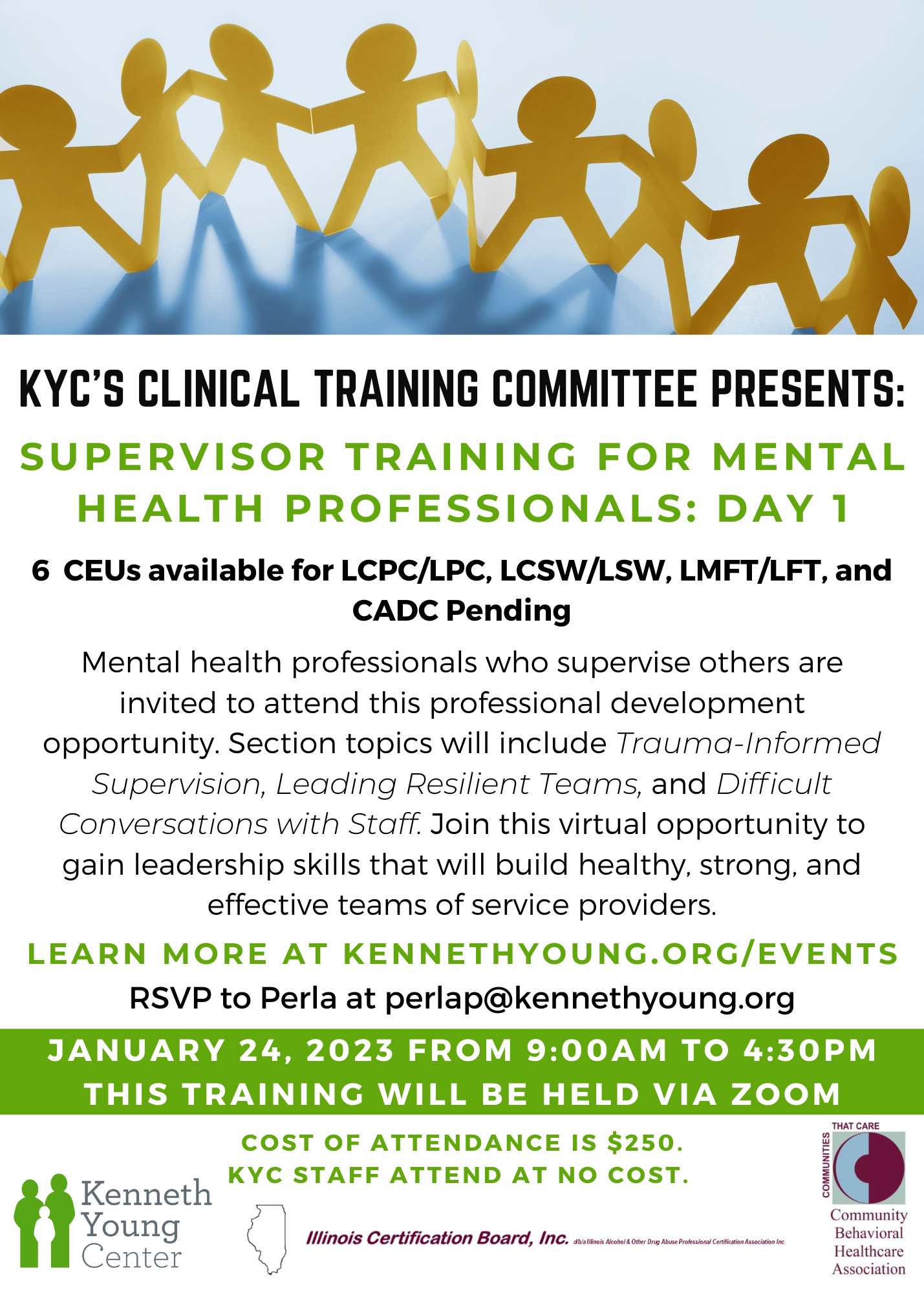
Tuesday, January 24, 2023
Supervisor Training for Mental Health Professionals: Day One
Mental Health Professionals who supervise others, join KYC’s Clinical Training Committee for a virtual professional development event to gain leadership skills that will build healthy, strong, and effective teams of service providers.
***An additional training opportunity will be offered on February 2nd that will cover more topics for mental health professionals who are supervisors. Learn more about Supervisor Training for Mental Health Professionals: Day Two here. Attendees who wish to join us for both days must enroll in each training event separately, though attendance at both days is not required. Whether you join us for one or two days of these training events, we look forward to learning together.***
Event Details
6 CEUs available for LCPC/LPC, LCSW/LSW, LMFT/LFT, and CADC Pending
Date: January 24, 2023
Time: 9:00 AM to 4:30 PM
Location: Virtually — Hosted by Kenneth Young Center
RSVP: Mental Health Professionals and KYC staff are welcome to join. Please contact Perla with questions. Please include your licensure in your RSVP email for efficient processing of your CEU credits.
Cost: $250 (KYC staff can attend at no cost)
January 24th Schedule:
9:00AM – 11:00AM: Trauma-Informed Supervision
11:00AM-12:00PM: Break
12:00PM – 2:00PM: Leading Resilient Teams
2:30PM – 4:30PM: Difficult Conversations with Staff
Topic Descriptions
Trauma-Informed Supervision
Helpers are exposed to the traumatic lived experiences of the people they are working with, putting these workers at high risk for secondary traumatic stress. In addition, the workplace can sometimes reenact traumatic encounters for workers with primary trauma, increasing their risk for re-traumatization and reducing their effectiveness at work. Accumulation of these different work stresses affect staff performance, so supervisors need to incorporate knowledge and awareness about traumatic stress into their leadership role and supervision practices. This section aims to help supervisors proactively manage a team through trauma exposure.
Learning Objectives
- Identify sources of primary and secondary traumatic stress
- Introduce preventative approaches to address traumatic stress
- Practice using a Trauma-Informed Supervisor self-assessment
- Plan for trauma exposure with staff
Leading Resilient Teams
Workers are increasingly being exposed to the distress and suffering of others as part of their work. Caregiver Fatigue is a natural and inevitable response to the toxic stress caused by this exposure and, if left unchecked, leads to exhaustion and burnout. An important role of a leader is to promote the health and wellbeing of their teams by deliberately emphasizing team care, resilience, and compassion satisfaction in the workplace. This section takes the learner through specific leadership strategies to do this.
Learning Objectives
- Creating shared values to build resilience
- Developing leadership stories to answer the “why”
- Motivating staff through storytelling
- Building protective teams
Difficult Conversations with Staff
We avoid difficult conversations because we don’t feel prepared for them. It makes sense to avoid something that’s difficult, but the delay could mean the problem situation growing rather than going away. In this section we review steps to make a potentially difficult conversation with a supervisee go according to plan with a direction and desired outcomes.
Learning Objectives
- Recognizing what makes a conversation difficult
- Preparing yourself
- Separating issues from personalities
- Developing a strategy not a script
- Clarifying your position without minimizing theirs
- Following up and following through
About the Speakers
Warren Duncan, Trainer
Warren Duncan, BS has had various roles throughout his career working with households experiencing homelessness and multiple barriers to stable housing. He has worked as direct support staff on mobile teams in Permanent Supportive Housing programs across the metro area, assisted in outreach efforts for program participants living on the streets and in shelter, and provided outreach to property managers and landlords, connecting them to support services in metro and greater Minnesota communities. He has worked to provide support to a network of supportive housing programs and community organizations among county, state, and local community agencies in Southern and Central Minnesota. He is currently overseeing all programming as Program Director for a Minnesota nonprofit. Warren enjoys facilitating workshops and has led a number of training sessions. Topics include Building Landlord Relationships, Housing First, Harm Reduction, Navigating Conflict, De-escalation, and Mindfulness. Warren grew up in Des Moines, Iowa and moved to Minnesota shortly after graduating from Iowa State University. He currently lives with his family in the Twin Cities western suburbs. He enjoys drawing, painting, and photography in his spare time.
Russ Turner, Director
During Russ’s 16-year tenure he has written and taught thousands of hours of person-centered curriculum to help people become more effective helpers, communicators, and leaders. His audience includes workers and leaders across a wide range of organizations from human services, healthcare, and libraries, to law enforcement and corrections. He trains trainers, works with management, and has consulted and coached on training projects across multiple sectors of the economy. He has worked as an educator for three decades in a variety of countries and settings including Japan, the Czech Republic, and the UK. His teaching philosophy is that adults learn best when they are challenged, the material is applicable to work situations, and sessions are interactive and engaging.
Event Flyer


